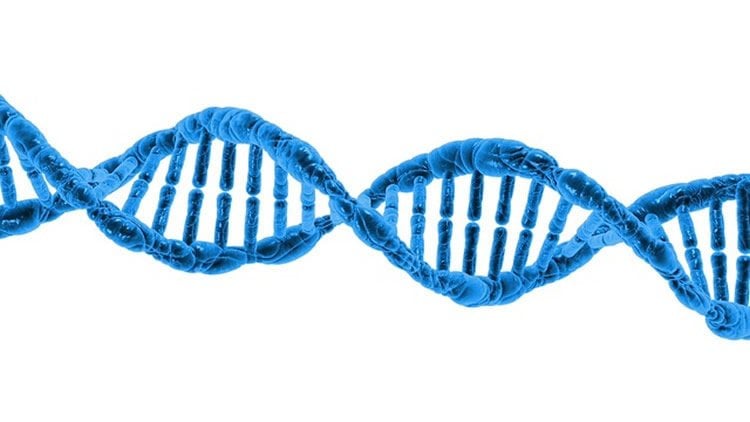Genes that influence people’s health also shape how effectively they think, a study shows.
Scientists found that genes associated with diseases including Alzheimer’s disease, schizophrenia, and autism also have an impact on some cognitive functions.
They say the study will help understanding of some of the links between low levels of cognitive function and poor health.
An international team, led by the University of Edinburgh, analysed data from around 100,000 people held in the UK Biobank.
This national resource of health data can help researchers discover why some people develop particular diseases and others do not.
When researchers compared each person’s mental test data with their genome, they found that some traits linked to disease and thinking skills shared the same genetic influences.
To test the findings, researchers gathered data from previous genetic studies of other mental and physical health factors — such as Alzheimer’s disease, schizophrenia and autism.
Professor Ian Deary, Director of the Centre for Cognitive Ageing and Cognitive Epidemiology (CCACE) at the University of Edinburgh, who led the research, said: “In addition to there being shared genetic influences between cognitive skills and some physical and mental health states, the study also found that cognitive skills share genetic influences with brain size, body shape and educational attainments.”

Researcher Saskia Hagenaars said: “The study supports an existing theory which says that those with better overall health are likely to have higher levels of intelligence.”
Her colleague Dr Sarah Harris said: “The research highlights the importance of investigating biological pathways that influence both cognitive function and health related traits.”
The study, published in Molecular Psychiatry, involved researchers in the UK, Germany and the US.
The analysis was carried out at the University of Edinburgh’s Centre for Cognitive Ageing and Epidemiology (CCACE).
Funding: The research was supported by the Medical Research Council (MRC) and the Biotechnology and Biological Research Council (BBSRC) as part of the Lifelong Health and Wellbeing programme, a collaboration between the UK’s Research Councils.
Source: Joanne Morrison – University of Edinburgh
Image Source: The image is in the public domain
Original Research: Full open access research for “Shared genetic aetiology between cognitive functions and physical and mental health in UK Biobank (N=112 151) and 24 GWAS consortia” by S P Hagenaars, S E Harris, G Davies, W D Hill, D C M Liewald, S J Ritchie, R E Marioni, C Fawns-Ritchie, B Cullen, R Malik, METASTROKE Consortium, International Consortium for Blood Pressure GWAS, SpiroMeta Consortium, CHARGE Consortium Pulmonary Group, CHARGE Consortium Aging and Longevity Group, B B Worrall, C L M Sudlow, J M Wardlaw, J Gallacher, J Pell, A M McIntosh, D J Smith, C R Gale and I J Deary in Molecular Psychiatry. Published online January 26 2016 doi:10.1038/mp.2015.225
Abstract
Shared genetic aetiology between cognitive functions and physical and mental health in UK Biobank (N=112 151) and 24 GWAS consortia
Causes of the well-documented association between low levels of cognitive functioning and many adverse neuropsychiatric outcomes, poorer physical health and earlier death remain unknown. We used linkage disequilibrium regression and polygenic profile scoring to test for shared genetic aetiology between cognitive functions and neuropsychiatric disorders and physical health. Using information provided by many published genome-wide association study consortia, we created polygenic profile scores for 24 vascular–metabolic, neuropsychiatric, physiological–anthropometric and cognitive traits in the participants of UK Biobank, a very large population-based sample (N=112 151). Pleiotropy between cognitive and health traits was quantified by deriving genetic correlations using summary genome-wide association study statistics and to the method of linkage disequilibrium score regression. Substantial and significant genetic correlations were observed between cognitive test scores in the UK Biobank sample and many of the mental and physical health-related traits and disorders assessed here. In addition, highly significant associations were observed between the cognitive test scores in the UK Biobank sample and many polygenic profile scores, including coronary artery disease, stroke, Alzheimer’s disease, schizophrenia, autism, major depressive disorder, body mass index, intracranial volume, infant head circumference and childhood cognitive ability. Where disease diagnosis was available for UK Biobank participants, we were able to show that these results were not confounded by those who had the relevant disease. These findings indicate that a substantial level of pleiotropy exists between cognitive abilities and many human mental and physical health disorders and traits and that it can be used to predict phenotypic variance across samples.
“Shared genetic aetiology between cognitive functions and physical and mental health in UK Biobank (N=112 151) and 24 GWAS consortia” by S P Hagenaars, S E Harris, G Davies, W D Hill, D C M Liewald, S J Ritchie, R E Marioni, C Fawns-Ritchie, B Cullen, R Malik, METASTROKE Consortium, International Consortium for Blood Pressure GWAS, SpiroMeta Consortium, CHARGE Consortium Pulmonary Group, CHARGE Consortium Aging and Longevity Group, B B Worrall, C L M Sudlow, J M Wardlaw, J Gallacher, J Pell, A M McIntosh, D J Smith, C R Gale and I J Deary in Molecular Psychiatry. Published online January 26 2016 doi:10.1038/mp.2015.225






